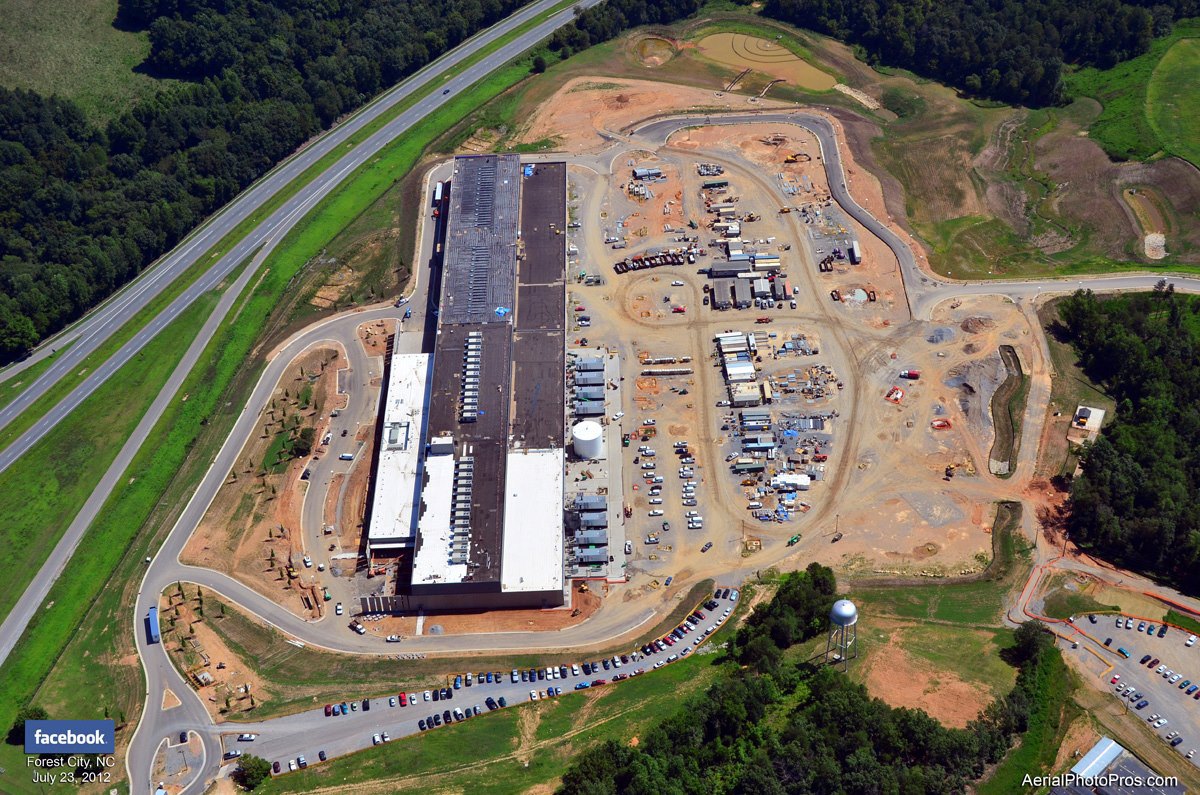Forest City, N.C., was once known as Burnt Chimney. But smokestacks are definitely a thing of the past, thanks to the social media giant Facebook, which is investing another $200 million to expand its data center campus there with a third, 480,000-sf building.
Construction reportedly is underway in Forest City, which lies between Asheville, N.C., and Greenville, S.C.
In a blog he posted on Facebook, Keven McCammon, the data center’s site manager, said that construction would add to a project that already has created “thousands of jobs in the regional economy and millions of dollars in economic impact.”
There’s no question that Facebook’s presence has been a boon to Forest City and its 7,400 local residents. The company invested $450 million into the first two buildings that each span 300,000 sf. RTI International, a firm Facebook retained to measure its economic impact, found that between 2011 and 2013 the data center had generated a total gross economic impact of $707 million and supported 5,000 jobs in North Carolina.
And since 2011, Facebook has awarded an estimated $575,000 to schools and qualified nonprofits in Rutherford County, where Forest City is located. Facebook recently agreed to support a pilot program to provide free WiFi access to 75 to 100 students in the local school district.
 Office space at Facebook's data center in Forest City.
Office space at Facebook's data center in Forest City.
Facebook, along with other tech companies, has favored North Carolina for its data center because of the state’s low-cost, reliable and available power, relatively inexpensive land, available water (at Forest City, Facebook is deploying evaporative cooling, which requires mist spray to cool the air as it enters the facility), proximity to East Coast customers, and generous tax incentives.
In June, Facebook announced plans to build a third data center on its campus in Altoona, Iowa, where its first data center there was already operational and a second was under construction. One month later, it broke ground on construction of a data center in Fort Worth, Texas, for which the company will invest $500 million in three 250,000-sf buildings. That data center, when it opens next year, will be powered entirely by wind power.
Facebook was the recipient of a $146.7 million incentive package from Fort Worth to locate its data center there. The Associated Press reports that state governments across the country over the past decade have extended nearly $1.5 billion in tax incentives to hundreds of data center projects initiated by various tech companies.
Facebook also has data centers in Pineville, Ore., and Lulea, Sweden.
Related Stories
| May 2, 2011
URS acquires Apptis Holdings, a federal IT service provider
SAN FRANCISCO, CA and CHANTILLY, VA– April 28, 2011 – URS Corporation and Apptis Holdings, Inc., a leading provider of information technology and communications services to the federal government, announced that they have signed a definitive agreement under which URS will acquire Apptis.
| Apr 12, 2011
BIM Grows Up: Separating Hype from Reality in a 3D World
While BIM adoption still lags in both design and construction, some enterprising owners, architects, and contractors are unlocking the potential of this dynamic technology.
| Apr 5, 2011
Are architects falling behind on BIM?
A study by the National Building Specification arm of RIBA Enterprises showed that 43% of architects and others in the industry had still not heard of BIM, let alone started using it. It also found that of the 13% of respondents who were using BIM only a third thought they would be using it for most of their projects in a year’s time.
| Mar 15, 2011
Future-proofing BIM: A White Paper presented by Dell and BD+C
To benefit from new building design and construction technologies as well as novel project management approaches, leading AEC organizations of all sizes and scales are deploying building information modeling (BIM). This White Paper presents the comparative benefits of various kinds of hardware specification, with some guidance on the proper selection and specification of BIM workstations, compatibility with existing standards, and adoption strategies.











